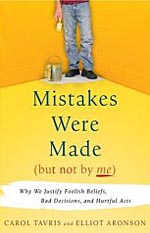Right up there with hunger, sex, and greed, one of the most powerful forces shaping human behavior is cognitive dissonance, the discomfort we experience when we make mistakes that jar our feelings of self-worth.
As with hunger, when we experience cognitive dissonance, we hasten to reduce it--in this case, by attempting to justify the mistake. Because our brains are hard-wired to reassure us, most of the time we don't even realize the psychological gymnastics that are taking place.
Which is precisely the problem, according to preeminent social psychologist Elliot Aronson, coauthor of the new book Mistakes Were Made (But Not By Me): Why We Justify Foolish Beliefs, Bad Decisions, and Hurtful Acts (New York: Harcourt, 2007).
In Mistakes Were Made, he and coauthor Carol Tavris spell out how the protective psychological mechanism of self-justification puts us on a slippery slope of self-deception that frequently gets us into enormous trouble when we are unable to acknowledge our mistakes.
A lively and engaging book, Mistakes Were Made is packed full of examples of people who've been ensnared by the all-too-human trap of self-justification. The authors chronicle President Bush's inability to change course in the war against Iraq despite the absence of weapons of mass destruction and the escalating financial and human costs, and they discuss how rank-and-file soldiers gradually came to mistreat prisoners at Abu Ghraib and why prosecutors refuse to drop charges against wrongfully convicted criminals after new DNA evidence establishes their innocence.
The stakes are highest for public figures because their actions affect the lives of so many, but the phenomenon is the same for us all, said Aronson, a professor emeritus of psychology at the University of California, Santa Cruz.
"Self-justification relieves cognitive dissonance and helps us sleep at night," said Aronson. "We're hard-wired this way because it smoothes our path a little bit. But we need to be vigilant so we're able to acknowledge our serious mistakes before we paint ourselves into a corner."
Most of the time, explained Aronson, the largely unconscious process of self-justification is harmless--it relieves the tension we experience after making minor social blunders and embarrassing gaffes. But it can have high personal and professional costs when we ignore our "blind spots" and attempt to justify foolish beliefs, bad decisions, and harmful actions. "We need to be vigilant so we're able to acknowledge our serious mistakes and learn from them," he said. "That's how we change destructive behavior and avoid making the same mistakes again and again."
In a famous laboratory experiment that illustrated the consequences of self-justification, two-thirds of participants administered what they thought were life-threatening levels of electric shock to another person, simply because the experimenter kept saying, "The experiment requires that you continue." The experiment, designed by social psychologist Stanley Milgram as a study of obedience to authority, is a chilling example of the chain reaction of behavior and self-justification that ensnares people, making ordinary people capable of immoral and harmful conduct.
Importantly, the electric shock experiment also highlights the step-by-step process that can lead us far from behavior we believe to be right or moral. "If Milgram had initially asked participants to administer a life-threatening shock of 450 volts to another person, almost all of them would have refused to obey," said Aronson. "But because he started them off with a small shock, and gradually increased the voltage, the participants justified each step along the way until the great majority were administering 450 volts."
"Self-justification helps us sleep well at night, but sometimes we shouldn't sleep well. I think we would all be better off, for example, if President Bush opened his eyes to reality even if it meant he might lose a little sleep," said Aronson, who has nearly 50 years of experience researching cognitive dissonance theory.
Aronson and Tavris devote two chapters to the role of self-justification in marriage and family life, illuminating the devastating consequences of self-righteous self-justification in such private arenas. "Most family rifts are caused or exacerbated by each party refusing to believe that he or she may be wrong. Each of us must strive to become aware of this tendency we all share," said Aronson. "Awareness of the process is the first step toward changing behavior. It's not easy, but it's doable."
Although the United States is a "mistake-phobic culture" that equates mistakes with incompetence and stupidity, Aronson believes institutions can be designed to reward admissions of mistakes. "Admitting wrongdoing allows psychological healing and sets the stage for better decisions in the future," said Aronson, recounting the experience of a junior executive at IBM who was responsible for a failure that cost the company $10 million. When IBM's legendary founder Tom Watson Sr. called the man into his office, the employee nervously said, "I guess you want my resignation?," to which Watson replied, "You can't be serious. We've just spent $10 million educating you!"
"If we want more people to take responsibility for their mistakes and then strive to correct them, we must start rewarding admissions of mistakes rather than make it uncomfortable for people to own up to them," said Aronson.
#####
Editor's Note: Aronson may be reached via e-mail at elliot@ucsc.edu or by calling Jennifer McNulty in the UCSC Public Information Office at (831) 459-2495.



